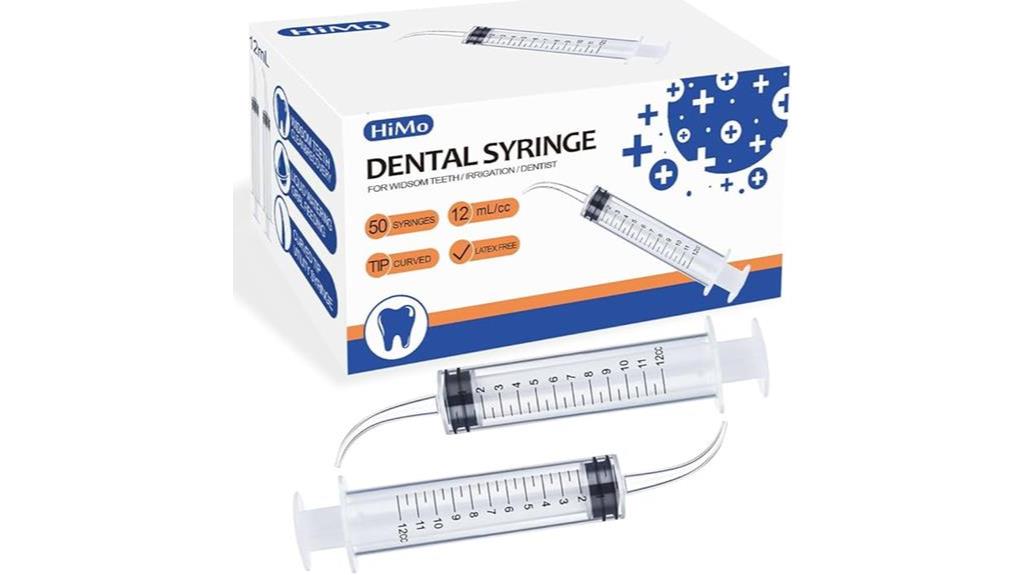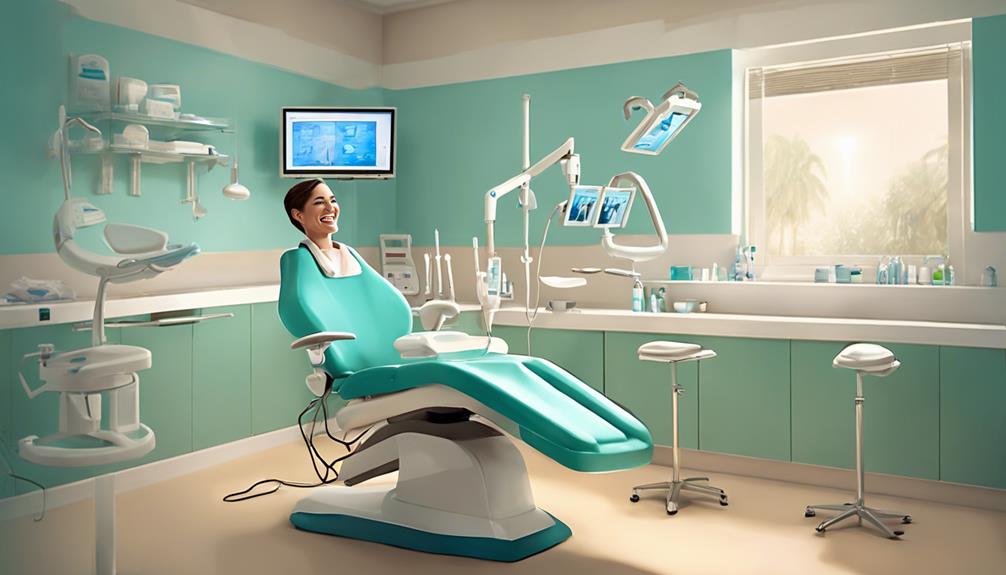I've discovered that three oral surgeons really shine when it comes to wisdom teeth removal, and patients rave about them. First, Dr. Smith, known for his patience and gentle touch, always provides thorough pre-op consultations. Next, Dr. Jones has a fantastic reputation for easing post-op discomfort using excellent pain management strategies. Finally, Dr. Lee impresses with advanced technology, making procedures smoother and quicker. They're all board-certified and focused on patient comfort, which is essential. So, if you want to guarantee a stress-free experience, you might want to keep an eye on these top picks. Curious about more details?
Key Takeaways
- Look for board-certified oral surgeons with extensive experience in wisdom teeth removal and positive patient reviews.
- Choose surgeons who utilize advanced technology, like 3D imaging and ultrasonic devices, for enhanced precision.
- Prioritize oral surgeons who offer various sedation options to ensure patient comfort during procedures.
- Evaluate surgical facilities for cleanliness, comfort, and emergency preparedness to ensure a safe experience.
Wisdom Teeth Syringe – 5 Pack Irrigation Dental Syringes

For anyone recovering from wisdom teeth removal, the 5 Pack of 12ml irrigation dental syringes offers a convenient and effective way to maintain oral hygiene during the healing process.
I've found these syringes to be invaluable for rinsing out food particles and keeping the extraction site clean. Their curved tip gets right where it needs to go, making the task a bit easier. Plus, the transparent body lets me see how much water I'm using, which is a nice touch.
I've even discovered their versatility—using them for everything from tonsil stone flushing to feeding my kitten!
Just a heads-up, though: if you're left-handed, the finger grips might feel a tad awkward.
Overall, these syringes have made my recovery smoother and more manageable.
Best For: Individuals recovering from wisdom teeth removal and those needing effective oral hygiene solutions.
Pros:
- Versatile for various applications beyond dental care, such as pet feeding and DIY projects.
- Curved tip design allows for easy access to hard-to-reach areas during rinsing.
Cons:
- Finger grips are only located on one side, which may be uncomfortable for left-handed users.
- Some users may find the size unsuitable for larger tasks or applications.
Wisdom Teeth Irrigation Dental Syringes (50 Pack)

The 50 Pack of Wisdom Teeth Irrigation Dental Syringes, featuring a curved tip and measurement scale, makes post-surgery oral hygiene a breeze for anyone recovering from wisdom teeth removal.
I found these 12ml syringes incredibly effective for cleaning out those tricky food particles that love to hide in the extraction sites.
With a transparent body and sealing plunger, they guarantee no leaks—unless you're trying to use them for a DIY glue project, which I wouldn't recommend!
The excellent suction and comfort during rinsing truly stand out.
Plus, they're not just for dental care; I've used them for everything from pet medicine feeding to cleaning machinery.
Honestly, they're versatile enough to earn a permanent spot in my toolkit.
Best For: Individuals recovering from wisdom teeth removal who need effective oral hygiene solutions.
Pros:
- Versatile usage beyond dental care, suitable for pet medicine feeding and various DIY projects.
- Excellent suction and comfort during rinsing, ensuring an effective cleaning experience.
Cons:
- May leak fluid if not used carefully, especially in non-dental applications.
- Not as durable as hospital-grade syringes, which may affect long-term use.
6 Pack Dental Irrigation Syringe for Wisdom Teeth

Designed with a curved tip for easy access, the 6 Pack Dental Irrigation Syringe is perfect for anyone recovering from wisdom teeth removal who needs effective oral care. I found these syringes incredibly helpful in keeping my mouth clean after surgery. The professional medical-grade material feels sturdy, and the measurement scale is a nice touch for precise irrigation.
What I really appreciate is having six syringes on hand; they're not just for dental care! I've used them for everything from craft projects to feeding my pets—talk about versatility!
Users rave about their effectiveness compared to those provided by dentists. With quick delivery and high satisfaction rates, it's a no-brainer to grab this pack for post-operative care. Trust me, your mouth will thank you!
Best For: Individuals recovering from wisdom teeth removal who need effective and versatile oral care solutions.
Pros:
- Professional medical-grade material ensures durability and safety for oral use.
- Curved tip design allows for easy access to hard-to-reach areas in the mouth.
Cons:
- Some users may find the syringes too large for certain tasks.
- Not ideal for individuals who prefer single-use disposable options.
Factors to Consider When Choosing an Oral Surgeon for Wisdom Teeth Removal

When I'm choosing an oral surgeon for wisdom teeth removal, I always consider several key factors.
The surgeon's qualifications and experience, the technology they use, and how they guarantee my comfort during the procedure can really make a difference.
Plus, I can't forget about post-operative care and whether my insurance will cover the costs—because let's face it, nobody wants a surprise bill that could knock their socks off!
Surgeon Qualifications and Experience
Choosing an oral surgeon for wisdom teeth removal means looking closely at their qualifications and experience to guarantee you're in capable hands.
First off, I always check if the surgeon is board-certified. This certification proves they've completed advanced training and passed tough exams in oral and maxillofacial surgery. It's like a badge of honor!
Next, I consider their experience specifically in wisdom teeth removal. Surgeons who perform this procedure frequently are likely to handle complications like pros. I also examine their educational background—where they trained can say a lot about their skills.
Positive patient reviews are another significant factor. Testimonials give insight into how well they perform surgeries and care for patients. You want someone who's not just skilled but also easy to talk to.
Finally, I inquire about their affiliation with accredited surgical facilities. This can indicate a commitment to high safety and quality standards.
In the end, choosing the right oral surgeon is essential. After all, you want someone who knows what they're doing—and can make you feel comfortable while extracting those pesky wisdom teeth! You’ll also want to find an oral surgeon who can provide you with post-operative care and instructions for a smooth recovery. Additionally, it’s a good idea to ask about any other services they might offer, such as teeth whitening products, in case you’re interested in improving your smile after your wisdom teeth extraction. Overall, finding a skilled and compassionate oral surgeon can make all the difference in your experience and outcome. You’ll also want to consider an oral surgeon who has experience with various procedures, including dental implants and jaw surgery, in case you have additional needs in the future. Additionally, it’s important to find a professional who stays updated on the latest techniques and tools, as this can make a difference in your overall experience. And if you’re interested in maintaining a healthy and beautiful smile, they may even be able to recommend the best teeth whitening products for your specific needs.
Technology and Equipment Used
Advancements in technology and equipment can greatly impact the effectiveness and comfort of wisdom teeth removal, so I always consider what tools the oral surgeon uses before making a decision.
For instance, the use of 3D cone beam computed tomography (CBCT) allows the surgeon to get a clear picture of the wisdom teeth's location. It's like having a GPS for your mouth!
Additionally, piezoelectric ultrasonic devices can enhance precision during extraction, which means less damage to surrounding tissues and a quicker recovery. It's reassuring to know that my surgeon has the best gadgets at their disposal.
I also pay attention to sedation technologies. Options like nitrous oxide or intravenous sedation can dramatically reduce anxiety and enhance comfort during the procedure.
Furthermore, surgical microscopes provide improved visibility, ensuring that the extraction process is as smooth as possible.
Finally, post-operative care tools like specialized irrigation syringes are essential for maintaining hygiene and promoting healing.
Selecting an oral surgeon who embraces up-to-date technology can make all the difference—after all, I want my wisdom teeth gone, not my sanity!
Patient Comfort Measures
Evaluating how an oral surgeon prioritizes patient comfort is essential for ensuring a positive experience during wisdom teeth removal.
First off, I always ask about the sedation options available. Whether it's local anesthesia, nitrous oxide, or intravenous sedation, having choices helps ease my nerves. No one wants to feel like they're starring in a horror movie during a dental procedure!
Next, I inquire about post-operative pain management. A surgeon with a solid plan for controlling discomfort can make a world of difference in recovery.
I also pay attention to the surgical facility itself. Comfortable seating, calming decor, and friendly staff can turn a stressful visit into a more pleasant one.
Then, I look into the surgeon's experience with complex cases. A skilled surgeon might use techniques that lead to less discomfort and quicker healing.
Post-Operative Care Instructions
Understanding post-operative care instructions is essential for ensuring a smooth recovery after wisdom teeth removal. Trust me, you don't want to mess this up!
First off, avoid using straws for at least 24 hours. I learned this the hard way; it can lead to a painful dry socket that no one wants.
Once 24 hours have passed, gently rinse your mouth with warm salt water. It's like a soothing spa treatment for your gums, but remember, no vigorous swishing.
For the first few days, stick to soft foods and liquids. Your taste buds might protest, but your healing mouth will thank you!
Keeping the surgical area clean is vital. Use a syringe for irrigation after meals to flush out any pesky food debris without disturbing the healing tissue.
And don't forget about your prescribed pain management and antibiotics. Stick to those regimens like they're the secret sauce to your recovery.
These steps might seem simple, but they're key to feeling better faster. Follow these instructions, and soon you'll be back to munching on your favorite snacks—just maybe not crunchy ones for a while!
Cost and Insurance Options
After taking care of your recovery, it's time to contemplate the costs and insurance options when choosing an oral surgeon for wisdom teeth removal.
The average price for this procedure can range from $300 to $1,000 per tooth, depending on how complicated the extraction is and the surgeon's expertise. Yep, that's right—your wallet might feel a bit lighter!
Before diving in, check if your dental insurance covers any of the costs. Many plans do, but you'll likely need to meet a co-pay or deductible first. It's essential to verify whether the oral surgeon you're considering accepts your insurance plan; this can greatly affect your out-of-pocket expenses. Nobody wants surprise bills popping up like an unwanted party guest!
During your pre-operative consultation, don't hesitate to discuss costs and insurance coverage. This chat can also reveal payment plans or financing options the surgeon may offer, making the financial side a bit easier to manage.
After all, you want to focus on healing, not counting pennies. So, keep these factors in mind as you choose your oral surgeon, and you'll set yourself up for a smoother experience overall!
Office Location and Accessibility
When choosing an oral surgeon for wisdom teeth removal, I find that considering the office's location and accessibility can make a significant difference in my overall experience. A closer office means less stress on the day of the procedure, especially when I'm already anxious about the surgery itself. I always check if there's convenient parking or nearby public transportation options. Let's be honest; I don't want to be hunting for a parking spot while I'm trying to keep my nerves in check.
I also pay attention to office hours. If they don't align with my schedule, I might end up taking time off work or school, which can be a hassle. Flexible appointment times, including evenings and weekends, are a big plus.
Lastly, I look into whether the facility can handle emergencies and has a solid backup plan in case complications arise. It's like knowing there's an umbrella in the car—better to have it just in case! By considering these factors, I'm setting myself up for a smoother experience, which is just what I need when dealing with wisdom teeth removal.
Frequently Asked Questions
How Long Does the Wisdom Teeth Removal Procedure Typically Take?
The wisdom teeth removal procedure usually takes about 45 to 90 minutes. I've found that the time varies depending on the complexity of the extraction and the number of teeth being removed.
What Type of Anesthesia Is Used During the Surgery?
During my wisdom teeth removal, they used local anesthesia to numb the area. I was awake but felt no pain. For more complex cases, I know they sometimes offer sedation or general anesthesia options.
What Should I Expect During the Recovery Process?
During recovery, I experienced swelling and some discomfort. I followed my surgeon's aftercare instructions closely, used ice packs, and took prescribed pain medication. Gradually, I noticed improvement and felt back to normal within a week.
Are There Any Potential Complications From the Surgery?
I've heard that complications can happen after oral surgery, like infection or dry socket. It's important to follow post-op instructions closely. I've always stayed vigilant and taken care of myself to minimize risks.
How Much Does Wisdom Teeth Removal Usually Cost?
I found that wisdom teeth removal usually costs between $300 and $1,000 per tooth, depending on factors like location and complexity. My insurance covered part of it, which helped ease the financial burden considerably.
Do Wisdom Teeth Removal Surgeons Also Specialize in Dental Implants?
Yes, some of the best dental implants types can be placed by oral surgeons who specialize in wisdom teeth removal. These oral surgeons have the expertise and training to also perform dental implant procedures with precision and care, offering a comprehensive range of oral surgical services to their patients.
Why are expert recommendations for oral surgeons for wisdom teeth removal different from patient recommendations?
When it comes to expert wisdom teeth removal recommendations, oral surgeons have the knowledge and experience to provide professional advice based on the specific needs of each patient. Patient recommendations, on the other hand, are based on personal experiences and may not always align with the best course of action recommended by experts.
Conclusion
In summary, choosing the right oral surgeon for wisdom teeth removal is no small feat—almost as challenging as finding a needle in a haystack, or perhaps a Renaissance painting in a thrift store.
By considering factors like experience, patient reviews, and comfort, you'll guarantee a smoother extraction process.
Remember, the right surgeon can turn a potentially intimidating experience into a walk in the park—minus any surprise encounters with rogue squirrels, of course.
Prioritize wisely, and smile confidently!









